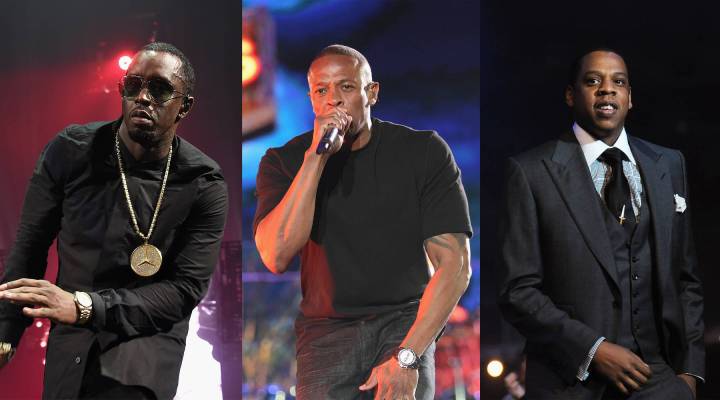
The three richest American musicians are all rappers

The three richest American musicians — of any genre — are all hip-hop artists. The empires of Diddy, Dr. Dre and Jay-Z are worth well over $2 billion combined. But when it comes to the financials, the music looks like a side hustle. The real money comes from their companies: liquor brands, Beats headphones, music streaming services and other endeavors.
Their unlikely journeys from hip-hop fame to business mogul-dom is the subject of a new book by Forbes senior editor Zack O’Malley Greenburg, “The 3 Kings: Diddy, Dr. Dre, Jay-Z and Hip Hop’s Multibillion-Dollar Rise.” You can read and excerpt here. The following is an edited transcript of a conversation he had with Marketplace host Kai Ryssdal.
Kai Ryssdal: You say in this book, at some point, that if these three guys took Myers-Briggs personality tests, they would each come out completely differently. I mean they are very, very different people.
Zack O’Malley Greenburg: They sure are. And you know, I forget the exact terminology of “ENTJ” and whatever it is, but I think a lot of people look at those three guys and say, they had the same job description, right? Hip-hop mogul. But really you couldn’t get more different in terms of personality. On one end of the spectrum, we’ve got Dr. Dre, who’s admittedly very shy, kind of an anxious dude, very reclusive. But he’s a perfectionist. And he works on his albums for years and years and years, sometimes shelves entire albums. He has five hundred songs in his vault unreleased because they’re not perfect enough. He’s only put out three full length albums in his career.
Ryssdal: That’s like a gazillion dollars sitting in the vault.
Greenburg: Yeah! And Beats by Dr. Dre was his one, real non-musical venture. But he spent so many years honing and perfecting it that it turned out to be this $3 billion business, according to Apple, who bought it for that much in 2014.
| Dre, Beats, headphones and possible cultural domination |
| Using the lessons of hip-hop to start a business |
| For a song’s popularity, not all streaming platforms are created equal |
Ryssdal: And then you look at the other two and they’re so much more public, right?
Greenburg: Yeah, especially Diddy. He’s sort of the traditional salesman. He’s out there in clubs and bars telling bartenders to put [his brand] Ciroc Vodka on a higher shelf. Very extroverted, very outgoing Jay-Z is somewhere in the middle. In a meeting, he’s the guy who’s kind of hanging back and then he’ll come in and deliver the point after he’s gauged the room, taken the temperature, that kind of thing.
Ryssdal: We should point out here the importance of fashion as a turning point in the careers of these three guys from music stars to other big-branded kinds of things.
Greenburg: For sure, and certainly throughout the ’90s, American mainstream and really, international, pop culture was starting to take fashion cues from hip-hop. And in fact there was there was a moment at which Jay-Z had a meeting with the brand called Iceberg. At the time, he was rapping about this brand a lot and basically asked for some kind of endorsement deal. And the people at Iceberg said they would maybe give him free clothes and that was it. I mean but maybe. And so Jay-Z went off and said, I’m going to start my own brand and that’s how he started Rocawear. That’s how Diddy started Sean John. And they were able to build up these streetwear brands into nine-figure companies, especially during the late-90’s heyday of that type of clothing.
Ryssdal: How do you reconcile the brand awareness, I suppose, and influence these three men have with the the roots of hip-hop and rap, and specifically their own individual histories with violence: violence against women and all of that.
Greenburg: Just to clarify Jay-Z and Diddy have never been accused of any violence against women. All three of them have had their episodes, run-ins with the law. There are a lot of people who rose from a somewhat nefarious means, and then came to a more mainstream acceptable place. I mean, JFK’s dad, right? He was a bootlegger. Jay-Z acknowledges that: he says, “cut from the cloth of the Kennedys.” And I think there’s also circumstance. If you don’t look a certain way, are you going to get the attention of the police? And, you know, it was a different world that they lived in, coming up in the ’70s and ’80s, than the one we live in today.
Ryssdal: Do you think people in the business world take these three as seriously as they take Elon Musk and Branson and Bill Gates and Steve Jobs, and all the rest of them?
Greenburg: I think over the past few years, they have gotten to a place where they are taken that seriously. You know, I think there’s been an awakening of recognition that hip-hop is not just this one-off youth fad. It has merged with and even overtaken mainstream American culture. And in order to tap into some of that consumer demand, you have to be conversant in hip-hop. Nobody knows hip-hop and nobody knows the new American culture better than these three in my mind.
Curious as to which hip-hop artist turned business mogul you relate to most? Check out our poll!
There’s a lot happening in the world. Through it all, Marketplace is here for you.
You rely on Marketplace to break down the world’s events and tell you how it affects you in a fact-based, approachable way. We rely on your financial support to keep making that possible.
Your donation today powers the independent journalism that you rely on. For just $5/month, you can help sustain Marketplace so we can keep reporting on the things that matter to you.












